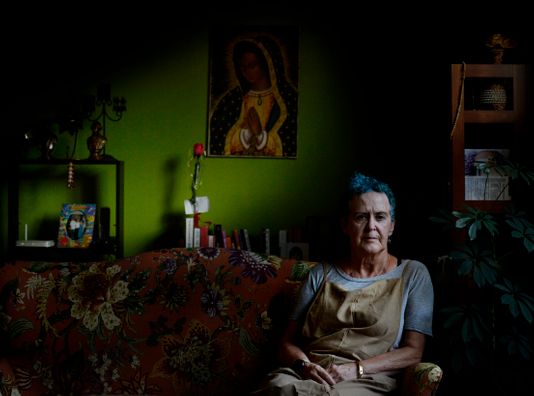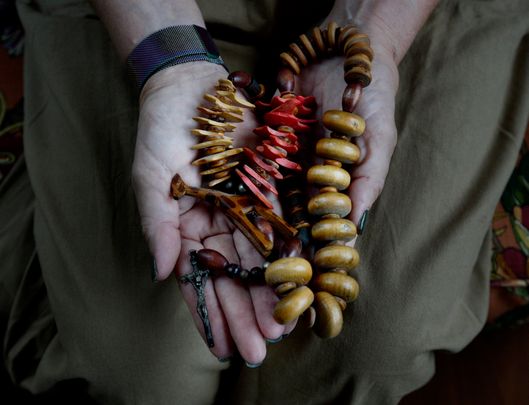Why This Mother of a Priest Abuse Survivor Still Has Faith in the Catholic Church
By Holly Meyer
Donna Harper is the mother of a survivor of priest abuse, but she still has faith in the Catholic Church. The Nashville native wants to do her part to protect children in her diocese and help other victims and their families overcome some of that animosity she knows well. So, Harper said yes more than 15 years ago when then-Nashville Bishop Edward Kmiec asked her to join the diocese's review board. At the time, the church was putting the panels in place at dioceses across the U.S. as part of the Catholic Church's response to its national clergy sex abuse crisis. Today, new allegations of abuse and cover-up are once again shaking the global church, putting its measures for child protection and leadership accountability under the microscope. The local review boards are among those measures. The panels advise their bishops on allegations of sexual abuse of children by priests and examine related policies. These non-investigatory bodies are made up of mostly lay people and include an experienced pastor as well as an expert on the treatment of child sex abuse. The abuse of her child Harper, a member of the Nashville diocese's board since its inception, said Kmiec tapped her to serve because she is the parent of a victim. "I had been very vocal and cranky," Harper said. "I wrote a note to Bishop Kmiec who had been very kind to just take my animosity and apologized." At the time, Harper felt the diocese had protected the priest who she says abused her child. He previously worked at the church she used to attend with her family. The abuse allegation came out years later, prompted by the 1999 arrest of former priest Edward R. McKeown, who is currently serving a prison sentence for raping a teenage boy. The crime McKeown pleaded guilty to in 1999 occurred after he left the priesthood in 1989. But at the time of his sentencing, the prosecutor in the case told The Tennessean that it was part of a pattern of abuse involving some 30 boys over more than two decades, and the diocese knew about some of the allegations but did not tell the police. Harper said her child, who was an adult at the time of McKeown's arrest, admitted to being one of his victims after she brought up their past relationship. Her child agreed to file a police report and eventually sought therapy. The more details Harper learned, the more upset she became. Leaving the parish not the church As time passed, Harper stayed Catholic but realized she needed a new church home. She followed her spiritual director, who helped her process what happened, to St. Patrick Catholic Church in Nashville. Harper is not a cradle Catholic. She converted in 1964 while in junior high and thinks that is part of why she stayed because she chose the Catholic Church instead of being born into it. The church's teachings in support of social justice and fairness continue to resonate with her, too. She knows clergy wrongdoing and church cover-ups go against the faith. "If everyone would adhere to the theology and the doctrine, we'd be better off," Harper said. "So, I stay with the theology and the basic teachings and pray for healing." She still worries about her child, who has largely fallen away from the church but is doing well and surrounded by a strong support system.
They talk about the clergy abuse crisis in the church, including the recent Pennsylvania grand jury report that says church leaders protected more than 300 "predator priests" for decades. It details widespread allegations of abuse of more than 1,000 victims. "It always dredges up painful feelings, but this time around I have great faith in Pope Francis and the way he's handling it," Harper said. She worries for the victims who have not spoken up. Harper hopes they use the recent wave of the crisis as an opportunity to come forward and find healing. Her animosity toward the Nashville diocese has subsided. "I know probably the feelings are there, to be honest," Harper said. "I just don't nurture them. I deal with it through my spiritual director. We talk about the issues and what's done and what is appropriate." Safe environment and abuse response And she continues to serve on the diocese's review board. The first meetings felt more like penance as they spent hours hammering out the diocese's policies on preventing and responding to abuse, Harper said. Today, their meetings are much shorter and largely spent reviewing those procedures. The eight-person panel meets three times annually but can be called as needed. The diocese has not received a contemporary allegation of abuse of a minor by a priest since the mid-1980s, Rick Musacchio, spokesman for the diocese said. But allegations have surfaced several years after the reported abuse, he said. Since 1952, nine diocesan priests have been accused, Musacchio said. Although, two of those priests were affiliated with the Knoxville and Memphis dioceses when the reports came forward. Nearly 20 years ago, the Nashville diocese shared its files on abuse allegations with prosecutors during the McKeown criminal investigation, Musacchio said. The diocese began to implement measures in the 1980s and 1990s to address abuse and protect children, including requiring background checks and creating a response team, Musacchio said. Abuse allegations in Louisiana and mandatory reporting laws were factors in the diocese's decisions to put those policies in place, he said. But the review board came out of the United States Conference of Catholic Bishops' adoption of the Charter for the Protection of Children and Young People in 2002. The charter set procedures for addressing allegations of clergy sexual abuse of minors in the wake of the national crisis and has been revised several times since. New wave of allegations highlights limitations The recent wave of abuse and cover-up allegations have brought renewed scrutiny to what the church should be doing to better protect children and respond to allegations. The Pennsylvania grand jury report as well as the July resignation of retired Cardinal Theodore McCarrick, who is accused of sexually abusing a minor 47 years ago, highlighted the limitations of measures already in place. The National Review Board issued a statement last month calling for a change in the culture of the church and revisions to the charter. Specifically, they also want the charter to apply to bishops accused of sexual abuse, not just priests and deacons. Cardinal Daniel N. DiNardo, president of the conference of bishops in the U.S., also is pushing for ways to make it easier to report bishop misconduct. The scathing Pennsylvania grand jury report said the charter did move the Catholic Church forward on addressing the sexual abuse in the church. But it pointed out areas of concern, including calling into question the effectiveness of diocesan review boards. It said some lacked training or did not have access to all records kept by bishops. And, in the end, only bishops can remove offenders. Review boards' lack of independence is stark when juxtaposed with the extensive information the Pennsylvania grand jury was able to reveal in its recent report, said Terence McKiernan, president of BishopAccountability.org, a group that collects data and researches sex abuse in the church. "They're contingent upon the very institution they're supposedly bringing some independence to," McKiernan said. In Nashville, Bishop J. Mark Spalding said in an August letter that the Pennsylvania grand jury report is a reminder that not all have responded properly to abuse allegations. "Their stories express the same pain and anger that led to the creation of the Charter for the Protection of Children and Young People in 2002 and they show that we must remain vigilant in our efforts to provide safe environments in all our parishes, schools, and institutions," Spalding wrote. The diocese adheres to the charter. Today, its Safe Environment program includes policies on responding to abuse of minors and abuse of professional relationships. The diocese also has a victim assistance coordinator as well as a code of conduct all church personnel must agree to and mandatory background checks. "We take this very seriously," Musacchio said. "The first thing is if anyone suspects abuse to report it to the civil authorities. That's a primary thing in our policies and we encourage that very strongly." The review board is one part of that process. Musacchio said Spalding, who was not available for an interview with the USA TODAY NETWORK - Tennessee, has a "very good" relationship with the panel. Spalding became the Nashville bishop earlier this year. Prior to that he was a priest in the Archdiocese of Louisville and served on its review board. "He has spoken quite a number of times about how he has come to truly value the participation of the laity when dealing with these difficult issues," Musacchio said. Harper has confidence in Spalding, especially given his experience with addressing allegations of abuse in the Archdiocese of Louisville. "I think his being in Nashville now, in case anything else comes up, is a great value to us," Harper said. "I have great faith in his ability to handle it and not sweep it under the rug."
|
.
Any original material on these pages is copyright © BishopAccountability.org 2004. Reproduce freely with attribution.

